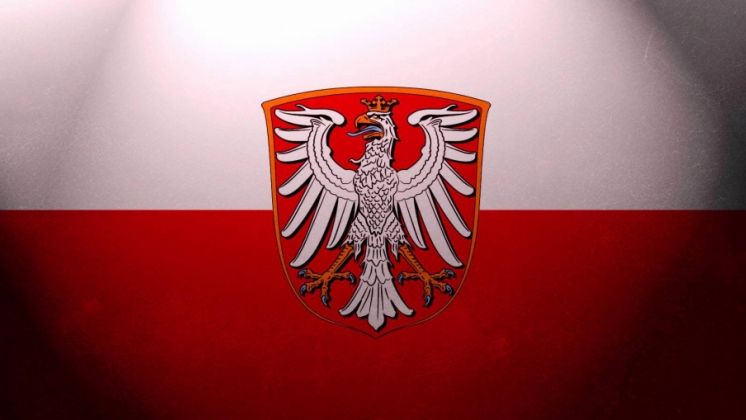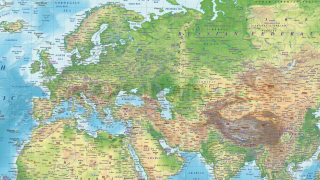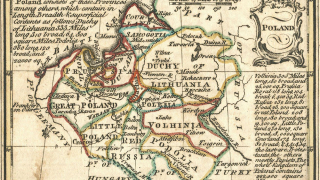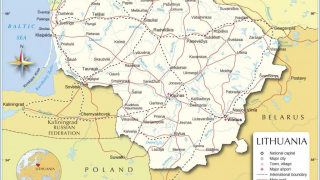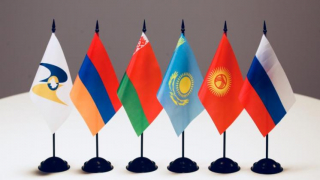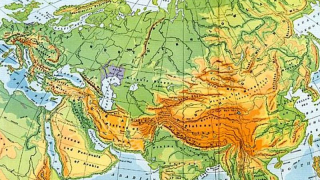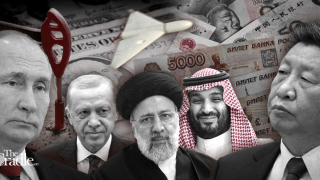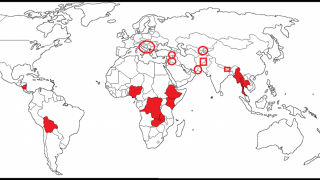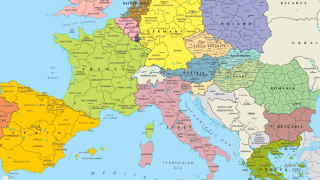About the (Almost) Ideal State
16.12.2017
Repeating that the modern state can be a complement to the human individuality and personality - is a common mistake, a lie, or a hopeless hope. On the contrary, since the last remnants of the traditional order were destroyed (in which the state was only one of the many entities partly endowed with a sense of sovereignty and not most important comparing with a position of the knight / noblemen, the role of estates of the realm, guilds, etc.), since the state acquired exclusivity – the only way was to aspire to omnipotence. Because, that is the only one way to perfection.
Contrary to popular opinion, the Stalinist state, not the fascist one, is closer to the ideal one (without an emotional attitude, just as for example the ideal circle should be). The difference was a consequence of implementing repressive policies. This Stalinist state is often misunderstood. While many people are scared about popular views of scale and scope of “Stalinist terror” - it is incorrect or not at all explained why innocent people were in fact persecuted and abducted – even those who did not pursue opposition activities against the regime and did not declare views contrary to official ideology. "Here is the crime!" - we hear and read often. Nothing more wrong.
If the state's sanctions were limited only to active oppositionists, or even to the critics of power, the other would have created a dangerous conviction that it was enough to not do anything against the government, not to say anything wrong, and live peacefully. So - let yourself be given the luxury of independence, even in your own mind. And this would be a denial of the omnipotence of the state. Because even the loyalty does not guarantee full security - it is then only known that the individual is nothing, and the state is all.
The democratic ideal state strives differently, eliminating simply in the human mind itself the pursuit of self-reliance, and repressing just on spots, but sometimes e.g. in form of some "anti-terrorist policy" as consistently as Stalinism. The purpose also is similar. It's not about that it is forbidden to work against the system or to criticise it – and now you do not have to love it either. It is enough for you to mindlessly repeat that there may be defects, but "it is the worst form of Government except for all those other forms that have been tried from time to time"...
So, when we at have concluded, that Stalinist state was almost perfect in unemotional, Platonic sense – we should understand its geopolitical role. And the best way to find that is to look what happened, when it had disappeared.
The researchers of the recent history of our part of Europe, whether they are left-revisionist (still dominating in the mainstream of the West) or anti-communist - agree in one point at least: a positive assessment of so called destalinization, ideological as well as the beginning of geopolitical processes, culminating in the victory of the West in the Cold War and the collapse of the Soviet Union.
The apparent paradox
Particularly in Poland (but also e.g. in Hungary etc.) the extraordinary dichotomy of society and power, especially alienated from the local tradition in Stalin’s times - does not seem possible other thinking about the Stalin epoch and its end. But reflection on the actual consequences of Khrushchev's Report, as well as the attempt to reflect on how else might have passed the history of the Eastern Bloc if Generalissimo had lived longer than a stupid 75 years - could lead to the conclusion that in fact the Poles, Hungarians and others Eastern Europeans, and also Soviets did not win again on the lottery of the Global History.
Does this thesis seem to be so shocking, so absurd? We all know what Stalinism was like in Poland and the rest of the Block: the period of power imposed (even in relation to some parts of the local communist movement), and in addition, especially repressive. With all the specifics of communism in my country – only during the Stalinist period there where some attempts to violate the Catholic Church and individual agriculture. Bloody sanctions were even applied to persons and backgrounds not engaged in active opposition activity (not to mention active attempts to oppose the authority, especially at an early stage), and even members of their own camp. The change of this position relates to the death of Stalin and then with the proper destalinization after the 20th Congress of the CPSU, which we recognize as Polish (and Hungarian…) October.
Who was saved by Stalin's death?
This vision seems coherent, and even the discourse of anti-Communists with the "converted communists" and the children of the Stalinists (revisionists) does not violate its essence, because they all in general agree on the necessity of change, however these second groups just recognize the "liberation of Eastern European countries" as a useful transitional period on the path to the final shaping of a new human being in a globalized World, so they even walked in forward of not only this change. However, it is worth considering whether Stalin's death actually brought Poland a favourable change - or rather almost made it impossible, and in other case very seriously delayed. After all, Generalissimo gone away on the threshold of another great turn - purge, also of a personal nature, but which actually could become the premise of much more significant transformations within the whole Block. Also in the Polish People's Republic appeared at the turn of 1952/53 the premise of weakening the influence of the ruling triumvirate Berman-Zambrowski-Minc and almost uniformly the ethnic leadership of the security apparatus. The same symptoms we can recognize e.g. in Czechoslovakia. Stalin's death interrupted this process, which allowed real Stalinists from Poland and other countries to regroup, reformat to the reformers, and ultimately hold the power behind new leaders, as in Poland Władysław Gomułka. Of course, another could be the course of events, if they were running faster in the Polish People's Republic and, for example, Berman shared Slansky's fate, although on the other hand knowing the short memory of our compatriots - one could imagine that as a victim of repression (if he survived) he could appear for naive Poles as another hero to the measure of "Wiesław" (in the end it was forgotten Zambrowski in Poland or in Hungary Nagy all their participation in Stalinization, not mentioned about the law-range officers). Anyway, paradoxically, Stalin's death did not make it easier, but almost prevented the removal of the circle known all over the Eastern Europe (mistakenly!) as “Настоящие сталинисты”.
Do we really like present days?
More important - also for our countries and nations - were, however, the systemic consequences of the first sunset of the Sun of the Nations, followed by the loud (though apparently unspoken) condemnation of "Cult of the Individual" on 24 and 25 February 1956. Although theoretically they can be divided into internal and geopolitical ones, in fact they all led to a single one - the fall of the Eastern Bloc, the capture of World domination by the United States, and, through them, the hegemony of one ideology and the new financial and political class. And again - even backing away from the final name of these final effects - revisionists and anti-communists remain consistent in recognizing that these were generally positive processes. The first ones, recognizing the victory of globalization and the progress of triumph over traditional values, the second ones appreciating the very fact of losing Communism as a system, and admiring the transient appearance of seemingly independent states formed on the ruins of the fallen Bloc. However, for all thinking healthy – if Stalinism was one and real problem for our nations – so called “destalinization” was much, much worse.
The fundamental question is whether in the interest of Poland and the rest actually was the victory of the West in the Cold War - today seems to be rhetorical, but after a moment of reflection should not seem so obvious. At least not for those who keep the critical judgment of the surrounding Polish, European and World realities. The current situation is not an accident at work, wrong choice of crossroads. We are faced with the consequences of choices made with full consciousness of the assumed goals. And although a far-reaching generalization would probably be perceived (without clear evidence, but only based on significant, but only indicative), never mind if the processes that have taken place over the past 60 years was a diabolic conspiracy or brilliant plan - we would be blind not to see what actually started with Stalin's death and Khrushchev's speech.
Crossed out unity
The geopolitical consequences are the most obvious. The policy after the 20th Congress led to a rapid decomposition of the Eastern Bloc, including the breakdown of the Soviet-Chinese ties and the establishment of a durable duality of the policies of the subsequent communist states, conflicts between them, played by international rivals, to the acquisition of the PRC by the United States for the anti-Soviet policy. We were in fact confronted with a question of a two-block division of the World, giving it an equal chance of winning for both players. Indeed, at least nowadays we have a chance to repair the effects of the Soviet-Chinese split within the framework of the present Russian-Chinese cooperation against common desire to polarize the World. But if the Moscow-Beijing dispute were not interrupted almost 60 years ago - we could avoid a few good decades of lost time and potential.
Equally serious were the consequences of detachment from the common roots of the communist party of the West, which descended more and more at the periphery of Eurocommunism, and indeed revisionism and acceptance of the Western geopolitical situation, and with time also economic and social reality of global Capitalism. The West Left, still living in the 1980s, even in seemingly serious anti-war movements, turned out to be dead and empty in the middle, unable to actively oppose US imperialist militarism and the all-powerful corporate capital. And it was just logical - since communism itself admitted to the essence of error, since it itself questioned its foundations, legitimacy, and righteousness, then the followers had no choice but to accept the ultimate victory of the opposite system.
Indeed, in the context of democracy and capitalism, the decline of faith in the prevailing values was (and is) entirely unlike the Communists – but the ruling classes of the West left that knowledge and consciousness to themselves, still serving the propaganda of ultimate victory, the only possible way and the absolute standing on one side only. In a brutal way, more consistent appeared to be "Stalinists" of demo-liberal capitalism, and they won.
... lost Faith
In the East, because of the erosion of the system, it was virtually impossible to stop it – because this process lasted in minds of the heads of the ruling parties. Following the condemnation of “the Cult of the Individual”, the loss of ideological legitimacy of the Communist Party led to a gradual decline in the sense of superiority, and thus to the atrophy of moral and intellectual legitimacy of the actions undertaken, which ultimately increased the bureaucratization of the Party, strengthened the consumerist tendencies inside its ranks and eventually led the party to choose the path to easier enrichment and maintenance of privileges by subjugation to Western and international financial organizations. Of course, this process once slowed down (slowed down by Gomułka in Poland or Ceaușescu in Romania), once was accelerated (e.g. by Gierek in Poland in the 1970s), but any attempt to suppress it was doomed. Once contaminated, cracked and properly discarded in its most important part, the superstructure has left the base weakened, and therefore, within the rather mockingly applicable law of necessity of conformity - this radical change of superstructure eventually led to a fundamental change in the economic base of the former Eastern Bloc.
The processes and events that we talk about here are facts that would be difficult to question even from the pre-eminent revisionist or anti-communist positions mentioned at the outset. The dispute, however, would certainly affect their evaluation - the aforementioned reasons. People cry for Stalin over the World – ant that is probably enough, but nevertheless, destalinization, as it actually passed, not through the prism of individual experiences, rescued lives, interrupted imprisonments, but as an ideological-political and geopolitical process -that is not, especially for Poland and the rest of Eastern Europe a particular reason for joy. As before, and after '56, we have remained just the object - the material of history, as the more compassionate, the as less understanding and aware of our role and the fate that has become our share.
Maybe in present times, probably almost in the end of history we live in the Global State much closer to the perfection, than Stalin’s one – but as a parody, antithesis. So if – why we still miss the previous one and just know, inside our minds that we were robbed? Because we do not miss Generalissimo personally, but some idea he personified. We miss the Tsar and the Real Ideal State - Eurasia.

